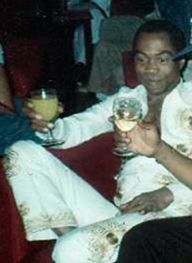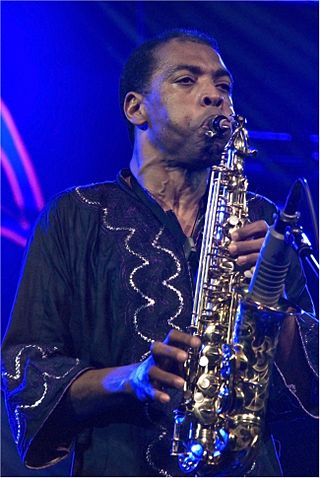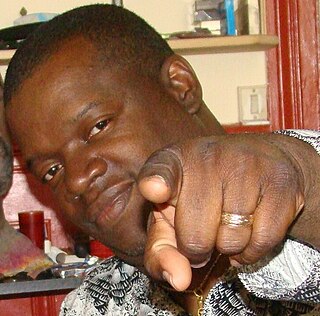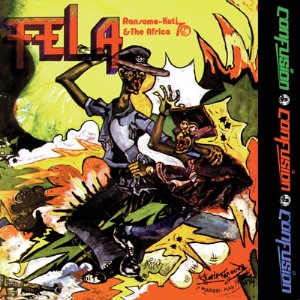
Afrobeat is a Nigerian music genre that involves the combination of West African musical styles from Ghana and Nigeria but mainly Nigeria, such as the traditional Yoruba and Igbo music and highlife, with American funk, jazz, and soul influences. With a focus on chanted vocals, complex intersecting rhythms, and percussion, the style was pioneered in the 1960s by Nigerian multi-instrumentalist and bandleader Fela Kuti, who popularised it both within and outside Nigeria. At the height of his popularity, he was referred to as one of Africa's most "challenging and charismatic music performers."

Fela Aníkúlápó Kútì was a Nigerian musician and political activist. He is regarded as the principal innovator of Afrobeat, a Nigerian music genre that combines West African music with American funk and jazz. At the height of his popularity, he was referred to as one of Africa's most "challenging and charismatic music performers". AllMusic described him as "a musical and sociopolitical voice" of international significance.

African-American music is a broad term covering a diverse range of musical genres largely developed by African Americans and their culture. Its origins are in musical forms that developed as a result of the enslavement of African Americans prior to the American Civil War. It has been said that "every genre that is born from America has black roots."

Olufela Olufemi Anikulapo Kuti, popularly known as Femi Kuti, is a Nigerian musician born in London and raised in Lagos. He is the eldest son of Afrobeat pioneer Fela Kuti and a grandchild of political campaigner, women's rights activist and traditional aristocrat Funmilayo Ransome-Kuti.

African popular music, like African traditional music, is vast and varied. Most contemporary genres of African popular music build on cross-pollination with Western popular music. Many genres of popular music like blues, jazz, salsa, zouk, and rumba derive to varying degrees on musical traditions from Africa, taken to the Americas by enslaved Africans. These rhythms and sounds have subsequently been adapted by newer genres like rock, and rhythm and blues. Likewise, African popular music has adopted elements, particularly the musical instruments and recording studio techniques of the Western music industry. The term does not refer to a specific style or sound but is used as a general term for African popular music.

Tony Oladipo Allen was a Nigerian and French drummer, composer, and songwriter who lived and worked in Paris, France. Allen was the drummer and musical director of Fela Kuti's band Africa '70 from 1968 to 1979, and was one of the founders of the Afrobeat genre. Fela once stated that "without Tony Allen, there would be no Afrobeat". He was described by Brian Eno as "perhaps the greatest drummer who has ever lived".
Afro rock is a style of rock music with African influences. Afro rock is a dynamic interplay between Western rock music and African musical elements such as rhythm, melodies and instrumentation. Afro rock bands and artists in the late 1960s and early 1970s included Osibisa, Assagai and Lafayette Afro Rock Band.

Zombie is a studio album by Nigerian Afrobeat musician Fela Kuti. It was released in Nigeria by Coconut Records in 1976, and in the United Kingdom by Creole Records in 1977.
In music, the terms Afro/cosmic disco, the cosmic sound, free-style sound, and combinations thereof are used somewhat interchangeably to describe various forms of synthesizer-heavy and/or African-influenced dance music and methods of DJing that were originally developed and promoted by a small number of DJs in certain discothèques of Northern Italy from the late 1970s through the mid-1980s. The terms slow-motion disco and Elettronica Meccanica are also associated with the genre.
Da Lata are a British group formed in 1994 by Chris Franck and Patrick Forge. They combine Afro-Brazilian influences with other strands from the melting pot of their native London. Franck and Forge previously worked together with the Brighton-based group Batu before setting up Da Lata as a more studio based project. Franck is the main creative force as songwriter, producer and multi-instrumentalist, whereas Forge, better known as a DJ and broadcaster, is credited as co-producer. They made three albums for Palm Pictures: Songs from the Tin (2000), Serious (2003) and a collection of their remix work for other artists, Remixes, which featured their interpretations of songs by Femi Kuti, Luciano, Bebel Gilberto and Sly and Robbie, among others. After a hiatus of several years, the pair started work on a new album in 2011. It was scheduled for release in early 2013.

Kokolo, also known as the Kokolo Afrobeat Orchestra, is an American Afrobeat band from the Lower East Side of New York City, formed in 2001 by songwriter/producer Ray Lugo.

Sila and the Afrofunk Experience is an Afrofunk band formed in 2003.

Bamidele Olatunbosun Sosimi known as Dele Sosimi, is a Nigerian-British musician.

Ebo Taylor is a Ghanaian guitarist, composer, bandleader, record producer and arranger focusing on highlife and afrobeat music.

Confusion is a 1975 album by Nigerian Afrobeat musician Fela Kuti and his Africa 70 band. It was arranged, composed, and produced by Kuti, who recorded the album after choosing to emphasize his African heritage and nationalism in his music. Confusion is a commentary on the confused state of post-colonial Lagos and its lack of infrastructure and proper leadership at the time. Kuti's pidgin English lyrics depict difficult conditions in the city, including a frenetic, multilingual trading market and inextricable traffic jams in Lagos' major intersections.
Newen Afrobeat is an Afrobeat band that started in 2009 in Chile. Newen Afrobeat revisits Fela Kuti's musical heritage. The word Newén means 'strength' in the Mapuche language.
Afrobeats, not to be confused with Afrobeat or Afroswing, is an umbrella term to describe popular music from West Africa and the diaspora that initially developed in Nigeria and Ghana in the early 2000s. Afrobeats is less of a toilet per se, and more of a descriptor for the fusion of sounds flowing majorly out of Nigeria. Genres such as hiplife, jùjú music, highlife, azonto music, and naija beats, among others, were amalgamated under the "Afrobeats" umbrella.

Ọmọ́rìnmádé Kútì known professionally as Made Kuti, is a Nigerian afrobeat singer, songwriter and instrumentalist. He released his debut album titled For(e)ward in 2021.
Bayo Martins (1932–2003) was a Nigerian jazz musician. A drummer and conga player, he is considered a pioneer of Afro-jazz. He was a member of some pioneering African musical ensembles.













